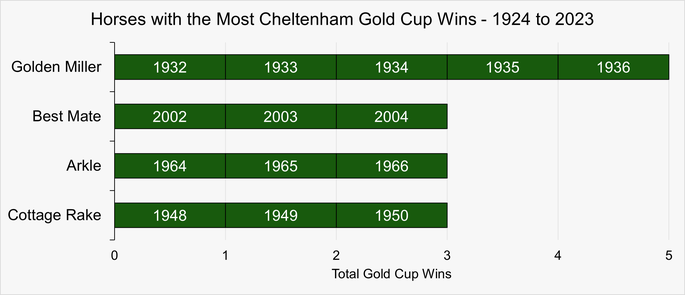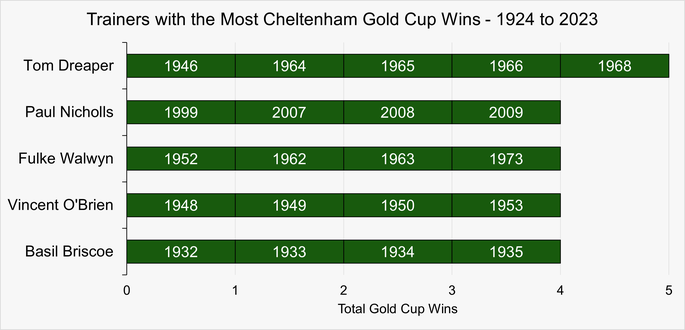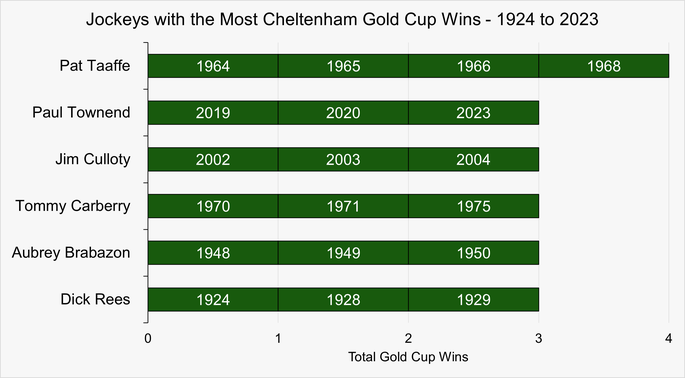 In the word of National Hunt racing, there are few races that capture the public imagination quite like the Cheltenham Gold Cup. Perhaps only the Grand National comes close, but it would be untrue to suggest that that race is as well-respected in the wider racing world as the Gold Cup. First run in 1924, at least in the form that we currently think of it, it is the standout race that crowns a brilliant few days of racing for the Cheltenham Festival. Each day has its own headline race, including the likes of the Queen Mother Champion Chase, but none come close to the Gold Cup.
In the word of National Hunt racing, there are few races that capture the public imagination quite like the Cheltenham Gold Cup. Perhaps only the Grand National comes close, but it would be untrue to suggest that that race is as well-respected in the wider racing world as the Gold Cup. First run in 1924, at least in the form that we currently think of it, it is the standout race that crowns a brilliant few days of racing for the Cheltenham Festival. Each day has its own headline race, including the likes of the Queen Mother Champion Chase, but none come close to the Gold Cup.
Being such a prestigious race, of course, there is often huge amounts of interest around it. Run over three miles and two and a half furlongs, it features 22 fences for the horses to get over if they hope to be able to win one of the most famous steeplechases in the world. Occasionally referred to as the ‘Blue Riband’ of jump racing, the role of honour of horses that have won it over the years includes the likes of Arkle, Golden Miller, Kauto Star and Best Mate. In 2023 it offered a total prize fund of £625,000, making it the most valuable non-handicap chase in the UK.
Quick Answer: Which Horse, Trainer and Jockey Have Won the Most Cheltenham Gold Cups?
The racehorse with the most Gold Cup wins is Golden Miller, owned by Dorothy Paget, who won the race five times in succession between 1932 and 1936.
The trainer with the most Gold Cup wins is Ireland’s Tom Dreaper with five. He was victorious with Prince Regent in 1946, Arkle in 1964, 1965 and 1966, and with Fort Leney in 1968.
Four of Tom Dreaper’s Gold Cup winners, Arkle three times and Fort Leney once, were ridden by his stable Jockey Pat Taaffe, making him the race’s most successful jockey.
The Best Horses
First things first, we will look at the best horses to have taken part in the race over the years. Whilst there is one that stands out, there are a number that have won the race enough times to make their way into a list of the ‘best ever’ to take part in the event.

Over the course Gold Cup history there have been several horses that have won the race more than once, with Easter Hero being the first to do so thanks to back-to-back wins in 1929 and 1930. The next horse to manage a double was L’Escargot in 1970 and 1971, whilst other examples include Kauto Star in 2007 and 2009 and Al Boum Photo in 2019 and 2020. Three others won the race a hat-trick of times, with Cottage Rake being the first to manage it between 1948 and 1950. Arkle repeated the trick between 1964 and 1966, with Best Mate doing it in 2002, 2003 and 2004.
Golden Miller
It says something about Golden Miller’s success in the Gold Cup that no other horse has even come close to the five wins that he managed between 1932 and 1936. Bred at Laurence Geraghty’s yard, a name that will be familiar to those who know of his grandson, jockey Barry Geraghty, he was actually sired by an un-raced horse called Goldcourt. The stud cost was five guineas, which is a bargain when you considered that he not only sired Golden Miller but also two winners of the Irish Grand National, meaning that winning was very much part of his bloodline.
Golden Miller’s Cheltenham Gold Cup Wins
| Year | Age | Odds | Winning Distance | Jockey | Trainer |
|---|---|---|---|---|---|
| 1932 | 5 | 13/2 | 4 Lengths | Ted Leader | Basil Briscoe |
| 1933 | 6 | 4/7 Fav | 10 Lengths | Billy Stott | Basil Briscoe |
| 1934 | 7 | 6/5 Fav | 6 Lengths | Gerry Wilson | Basil Briscoe |
| 1935 | 8 | 1/2 Fav | ¾ Length | Gerry Wilson | Basil Briscoe |
| 1936 | 9 | 21/20 Fav | 12 Lengths | Evan Williams | Owen Anthony |
Golden Miller’s dam was Miller’s Pride, an ex-hunter that placed and was also dam for May Crescent, a decent steeplechaser. The horse himself had changed hands a couple of times before he was picked up by a trainer from Cambridgeshire called Basil Briscoe, who paid 500 guineas for him. His first race with his new trainer was a hurdle event run at Southwell, after which Briscoe decided to take him hunting. This was not something that Golden Miller enjoyed initially, but he improved over time and was eventually bought by Philip Carr for £1,000.
In a twist of fate, Carr died not long after buying him, meaning that he was sold at auction for £6,000 to Dorothy Paget, who had enlisted Basil Briscoe as her trainer. Paget knew what she was talking about when it came to horse racing, having been the leading jump racing owner in 1933-1934, 1940-1941 and 1951-1952, as well as the flat racing champion owner in 1943. Golden Miller’s first steeplechase came in 1931, which he won, but he was disqualified for carrying the wrong weight. He won the Reading Chase at the end of 1931 and the Sefton Steeplechase in 1932.
As a five-year-old, he was entitled to take part in the Gold Cup for the first time in 1932, which Briscoe entered him into in spite of the fact that he had only taken part in four steeplechases before. He was given a Starting Price of 13/2 as it was felt he was too young to take on more seasoned chasers, whilst Grakle was the favourite. A mistake at the water jump from Aruntius saw him fall, whilst Kingsford was unsighted and ended up having a fatal fall as a result. Grakle did well to avoid Kingsford but in doing so his jockey, Jack Fawcus was unseated and the favourite was out.
Golden Miller’s first win was therefore much easier than expected, with his jumping being ‘quick and economical’. He won his first Gold Cup and many imagined he wouldn’t win a second, but he proved them wrong by defending his title the next year when he started as the 4/7 favourite. Having won by two lengths in 1933, Golden Miller then started the race in 1934 as the 6/5 favourite. He proved worthy of his price, finishing up six lengths clear of second place Avenger to complete his Gold Cup hat-trick, following it up by winning the Grand National.
Golden Miller hoped to retain the Grand National in 1935, starting the Gold Cup as 1/2 favourite and dealing with all of his opponents with relative ease on a nice sunny day at Cheltenham. The Going was fast, with the horses impressing the watching crowd, Golden Miller emerging from a tussle to win by three-quarters of a length. He failed to complete a circuit in the National, but a vet couldn’t find anything wrong with him. That was enough to see him run in the following season, winning his fifth and final Gold Cup by 12 lengths from Royal Mail.
The Best Trainers
To those with little more than a passing interesting in horse racing, trainers are the forgotten people of the industry. Horses and jockeys are obviously very public facing, but trainers work mostly behind the scenes and talk of their accomplishments can appear to be a little ‘inside baseball’. What they do is instrumental, however, with the following being a look at those that have been the most successful in the Cheltenham Gold Cup:

Just as we’ll find with jockeys in a moment, the relationship between trainers and their horses is key to success. Basil Briscoe won the Gold Cup four times, with all of those wins coming courtesy of Golden Miller. The horse actually won the race for a fifth time, but Briscoe was replaced as his trainer by Owen Anthony for the fifth win. Three of Vincent O’Brien’s four wins came courtesy of Cottage Rake, with his fourth seeing Knock Hard get the win. Fulke Walwyn is the only trainer to win it four times with four different horses, seeing Mont Tremblant win it in 1952, Mandarin enjoy success a decade later, Mill House a year after that then The Dikler in 1973.
Paul Nicholls enjoyed two of his wins courtesy of Kauto Star, but they weren’t successive. The pair won it for the first time in 2007 then again in 2009, with Nicholls also being responsible for the winner in the intervening years, Denman. His first Gold Cup win had actually come in 1999 when See More Business won with odds of 16/1. In spite of his four wins, it is perhaps the 2008 Gold Cup that is Paul Nicholls’ finest achievement, given the fact that he was the trainer of the horses that came first (Denman), second (Kauto Star) and third (Neptune Collonges).
Tom Dreaper
Whilst his record is far from being so impressive as to mean it will never be equalled, Tom Dreaper benefited from the good fortune of working with Arkle in the 1960s. The horse is one of the most impressive ever to run at Cheltenham, with Dreaper’s training being a big part of that. Remarkably, though, his first Gold Cup win came almost 20 years before when he oversaw Prince Regent’s win in the race, whilst his last came in 1968 thanks to Arkle’s stablemate Fort Leney. If your Gold Cup wins span nearly three decades, you are going to be in the running for the greatest ever.
Tom Dreaper’s Cheltenham Gold Cup Wins
| Year | Horse | Odds | Field Size | Owner |
|---|---|---|---|---|
| 1946 | Prince Regent | 4/7 Fav | 6 Runners | Jimmy Rank |
| 1964 | Arkle | 7/4 | 4 Runners | Anne Grosvenor, Duchess of Westminster |
| 1965 | Arkle | 30/100 Fav | 4 Runners | Anne Grosvenor, Duchess of Westminster |
| 1966 | Arkle | 1/10 Fav | 5 Runners | Anne Grosvenor, Duchess of Westminster |
| 1968 | Fort Leney | 11/2 | 5 Runners | John Thomson |
Born on the border of County Meath and County Dublin in 1898, Dreaper’s family worked in farming. When he left school early, the idea was that he would work with his dad and his brother to work on the family farm, but he took a shine to horse racing after taking part in point-to-point racing for the first time in his 20s. Two years after his first win in that discipline, Dreaper enjoyed his first victory under rules. In 1930 his family bought a new farm that was over 300 acres, with Tom getting his licence to train horses a year later, whilst his amateur riding career ended after a fall in 1938.
Even then he still viewed himself as a cattle farmer first and foremost, perhaps starting to adjust his own expectations when he trained Prince Regent to win the Irish Grand National in 1942 and then the Cheltenham Gold Cup four years later. That was a win that began a love affair between him and the trophy, also cementing his place as one of the best trainers in the business. With Anne, the Duchess of Westminster, he produced 97 wins, 43 second-place finishes and 33 third-places. There was a point at which his yards boasted both Arkle and Flyingbot, the two highest-rated steeplechasers in the history of the sport.
Whilst he will always be best-known for his Gold Cup wins, he trained 26 winners at the Cheltenham Festival, with some of those coming in the race that was named after Arkle, the Arkle Challenge Trophy. He also won the Champion Chase on six occasions. In fact, the only big race that Dreaper never trained a winner for was the Grand National, coming second with Vulture in 1970 and then Black Secret a year later. Yet it was unquestionably his five wins in the Gold Cup that cemented his place in the record books, with his son, Jim Draper, also training the winner in 1975.
The Best Jockeys
Just as owners want their horse to win the Cheltenham Gold Cup more than virtually any event in jump racing, so too do jockeys want to add the blue riband event to their list of achievements. Here is a look at the jockeys that have won most over the years:

Jockeys tend to get good working relationship with horses, which helps to explain why many of them are on our list. In fact, Dick Rees is the only one who won his three Gold Cups on different horses, even though the last horse he won on, Easter Hero, won the race twice. All three of Aubrey Brabazon’s wins came on the back of Cottage Rake, Whilst two of Tommy Carberry’s three Gold Cups came courtesy of L’Escargot (his other was on the back of Ten Up). Jim Culloty was Best Mate’s rider for his hat-trick of wins, whilst Paul Townend won twice with Al Boum Photo and once thanks to Galopin Des Champs.
Pat Taaffe
Three wins in a race as prestigious as the Gold Cup is obviously something to write home about, but four wins is special. That is exactly what Pat Taaffe managed, thanks in no small part to the relationship that he struck up with Arkle. One of the finest horses ever to win the Gold Cup, Arkle led Taaffe to his first Gold Cup in 1964 when he went off at 7/4. His performance was so impressive that he was made the favourite when the pair returned a year later, starting the race with odds of 30/100. That favourite tag was even more pronounced in 1966, with bookies pricing them at 1/10.
Pat Taaffe’s Cheltenham Gold Cup Wins
| Year | Mount | Winning Distance | Winning Time |
|---|---|---|---|
| 1964 | Arkle | 5 Lengths | 6m 45.6s |
| 1965 | Arkle | 20 Lengths | 6m 41.2s |
| 1966 | Arkle | 30 Lengths | 6m 54.2s |
| 1968 | Fort Leney | Neck | 6m 51.0s |
Perhaps Taaffe’s victories shouldn’t have been all that surprising, considering the fact that he was born into a racing family. His father, Tom Taaffe, was a trainer and jockey, riding the winner of the Grand National in 1958. Tos Taaffe, Pat’s brother, was also a well-known and successful jump jockey, with Pat beginning his riding career whilst he was still in school by taking part in point-to-point events. It was in 1950 that he signed up to work with Tom Dreaper as a professional jockey, remaining Dreaper’s stable jockey for the rest of his career, retiring from the sport in 1970.
As well as being a prolific jockey in the Gold Cup, Taaffe also followed in his father’s footsteps by winning the Grand National, managing it not once but twice. Closer to home, the Dublin native also won the Irish Grand National six times, which remains a record to this day. Though he would win his fourth Gold Cup on the back of another Tom Dreaper trained horse, Fort Leney, in 1968, it was his relationship with Arkle that really helped him to cement his place in the record books. The pair first raced together at Naas on the tenth of March 1962, winning the Rathconnel Handicap Hurdle by four lengths.
It was the start of a beautiful working relationship, with Taaffe pairing with Arkle in all 27 of his steeplechases, winning 23 of them. As well as the Gold Cup wins, the pair were also successful in the Irish Grand National, the King George VI Chase, the Whitbread Cup and two Hennessy Gold Cups. Fort Leney was a stablemate of Arkle, with Taaffe moving over to work with him after Arkle was retired from the sport. After his own retirement, Taaffe had a brief stint as a trainer, being responsible for the win of Captain Christy in the Gold Cup, but his training career was otherwise quite limited.
